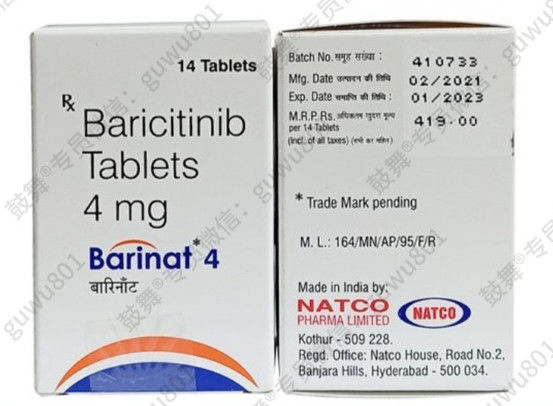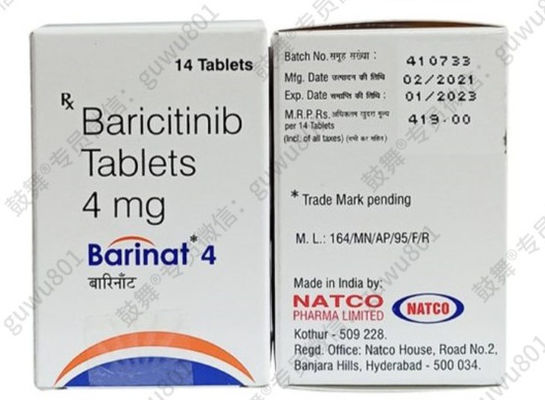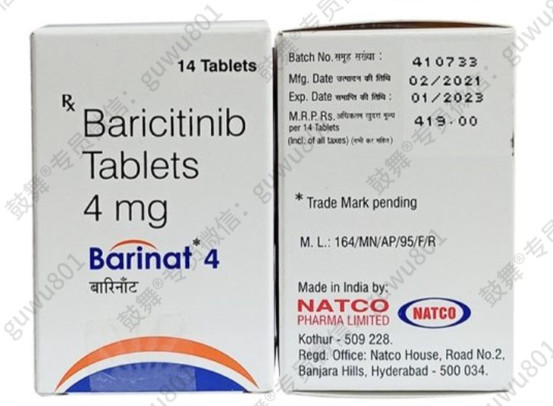【药品名】
通用名:巴瑞替尼片
产品名称: OLUMIANT®
英文名称:Baricitinib Tablets
汉语拼音:Baruitini Pian
【适应症】
类风湿关节炎:巴瑞替尼适用于对一种或多种改善病情的抗风湿药物 (DMARD) 无效或不耐受的中度至重度活动性类风湿关节炎成年患者.巴瑞替尼可与甲氨蝶呤或其他非生物制剂改善病情的抗风湿药物联合使用.
斑秃:巴瑞替尼适用于治疗成人重度斑秃.不建议与其他JAK抑制剂,生物免疫调节剂,环孢素或其他强效免疫抑制剂联合使用.
【剂量】
类风湿关节炎
治疗应由具有诊断和治疗类风湿性关节炎经验的医生进行.
巴瑞替尼的推荐剂量为每日一次,每次 2 毫克.
对于以下人群,可以考虑4mg每日一次给药:1)对于对传统改善病情的抗风湿药(csDMARDs)疗效不佳或不耐受的中度至重度活动性类风湿关节炎成年患者,建议以2mg每日一次开始治疗,治疗3个月后疗效仍不佳的患者,或2)对肿瘤坏死因子抑制剂(TNFi-IR)疗效不佳的患者.
斑秃
巴瑞替尼的推荐剂量为每日一次,每次 2 毫克.
如果治疗效果不佳,可考虑将剂量增加至每天一次4毫克.
对于几乎完全或完全脱发的患者,无论睫毛或眉毛是否大量脱落,都可以考虑每天服用 4 毫克一次.
当患者对 4 毫克治疗产生足够反应时,剂量应减少至每天一次 2 毫克.
肾脏损害
对于肌酐清除率在30至60 mL/分钟之间的患者,如果巴瑞替尼的推荐剂量为4 mg,每日一次,则减量至2 mg,每日一次.如果巴瑞替尼的推荐剂量为2 mg,则不建议使用;
不建议肌酐清除率 <30 mL/分钟的患者使用巴瑞替尼.
肝损害
轻度或中度肝功能不全患者无需调整剂量.不建议重度肝功能不全患者使用巴瑞替尼.
与OAT3抑制剂联合用药
对于接受强效有机阴离子转运体3(OAT3)抑制剂,如丙磺舒的患者,如果巴瑞替尼的推荐剂量为4mg每日一次,则将其减量至2mg每日一次;如果巴瑞替尼的推荐剂量为2mg每日一次,则不建议使用本品.
绝对淋巴细胞计数 (ALC) 低于 0.5 × 109 个/升,绝对中性粒细胞计数 (ANC) 低于 1 × 109 个/升或血红蛋白值低于 8 g/dL 的患者不应开始治疗.一旦数值改善至高于这些限值,即可开始治疗.
它可以口服,一天中的任何时间,与食物一起或单独服用均可.
【不良反应】
安全功能摘要
最常见的药物不良反应(ADR)为低密度脂蛋白(LDL)胆固醇升高,上呼吸道感染,头痛,单纯疱疹和尿路感染.类风湿关节炎患者偶尔可发生重症肺炎和重症带状疱疹.
不良反应列表
频率估计:非常常见(≥ 1/10),常见(≥ 1/100 至 < 1/10),偶见(≥ 1/1,000 至 < 1/100),罕见(≥ 1/10,000 至 < 1/1,000),非常罕见(< 1/10,000).除非另有说明,表 1 中的频率基于类风湿性关节炎,特应性皮炎和斑秃适应症的临床试验和/或上市后数据.如果在不同适应症中观察到显著的频率差异,这些差异将在表格下方的脚注中列出.
▼表1:不良反应
系统器官分类 很常见 常见 偶尔
感染和传染病 上呼吸道感染
带状疱疹b
单纯疱疹
胃肠炎
尿路感染
传染性肺炎
血液和淋巴系统疾病
血小板增多症 > 600 x 109 细胞/La,d 中性粒细胞减少症 < 1 x 109 细胞/La
代谢和营养疾病 高胆固醇血症
高甘油三酯血症
各种神经系统疾病
头痛
胃肠系统疾病
令人恶心
腹痛
憩室炎
肝胆系统疾病
ALT 水平升高 ≥ 3 x ULNa,d AST 水平升高 ≥ 3 x ULNa,e
皮肤和皮下组织疾病
皮疹,痤疮
免疫系统疾病
面部肿胀,荨麻疹
呼吸,胸部和纵隔疾病
肺栓塞f
血管和淋巴疾病
深静脉血栓形成
各类检查
肌酸磷酸激酶水平升高 > 5 x ULNa,c 体重增加
a 包括实验室监测期间检测到的变化(见下文).
b 带状疱疹和深静脉血栓形成的发生率基于类风湿性关节炎的临床试验.
c 在类风湿性关节炎的临床试验中,偶尔会出现痤疮和肌酸磷酸激酶水平升高 >5 × ULN.
d 特应性皮炎临床试验中偶见恶心,ALT≥3×ULN.斑秃临床试验中偶见腹痛.特应性皮炎和斑秃临床试验中偶见感染性肺炎,血小板增多症>600×109细胞/L.
e 在斑秃临床试验中,AST ≥3×ULN 的发生很常见.
f 根据类风湿性关节炎和特应性皮炎临床试验得出的肺栓塞发生率.
[孕妇及哺乳期妇女用药]
怀孕
研究表明,JAK/STAT通路与细胞粘附和细胞极性有关,可能影响早期胚胎发育.目前尚无关于孕妇使用巴瑞替尼的数据.动物研究表明该药物具有生殖毒性.
巴瑞替尼禁用于妊娠期.育龄女性在治疗期间及治疗后至少一周内必须采取有效的避孕措施.如果患者在服用巴瑞替尼期间怀孕,应告知其该药物可能对胎儿造成风险.
哺乳
尚不清楚巴瑞替尼及其代谢物是否会经人乳汁排泄.动物研究的药效动力学/毒理学数据显示,巴瑞替尼可经母乳排泄.
巴瑞替尼对新生儿/婴儿的风险无法排除,哺乳期不应使用.在决定是否停止母乳喂养或停用巴瑞替尼治疗时,应考虑母乳喂养对婴儿的潜在益处以及治疗对母亲的潜在益处.
生育能力
动物研究表明,巴瑞替尼治疗期间可能会降低雌性动物的生育能力,但不会影响雄性动物的精子发生.
[儿童用药]
巴瑞替尼对 18 岁以下儿童和青少年的安全性和有效性尚未确定.
【老年人用药】
≥75岁患者的临床经验非常有限,年龄≥65岁或≥75岁不会影响巴瑞替尼的暴露量(Cmax和AUC).
【贮存】
储存温度不超过30℃.


 Your message must be between 20-3,000 characters!
Your message must be between 20-3,000 characters! Please check your E-mail!
Please check your E-mail!  Your message must be between 20-3,000 characters!
Your message must be between 20-3,000 characters! Please check your E-mail!
Please check your E-mail! 



